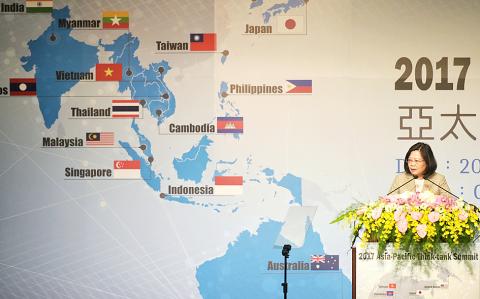President Tsai Ing-wen (蔡英文) yesterday stressed the importance of think tanks in the formation of government policy and said she hopes that such organizations could help the nation find its place in the new world order.
Tsai made the remarks in her opening speech at the inaugural Asia-Pacific Think Tank Summit in Taipei, a meeting that is bringing together more than 30 leaders of think tanks from 15 nations in the Asia-Pacific region to address pressing issues and shared concerns.
Participants came from Japan, South Korea, the US, India, Australia and several other ASEAN members for the two-day meeting that is to conclude today.

Photo: Chang Chia-ming, Taipei Times
The event was organized by the Institute for National Policy Research (INPR) in collaboration with the Taiwan Society of Japan Studies and the Center for Japanese Studies at National Sun Yat-sen University.
In an increasingly interconnected world, every decision could have far-reaching consequences, especially decisions concerning security and defense issues, Tsai said, adding that they could directly effect the national interests of all parties.
“It is therefore vital for policymakers to be well-informed by institutions that have the capacity for comprehensive research and are able to give impartial advice and analysis,” Tsai said, adding that due to their expertise, think tanks are sometimes more equipped than governments to make long-term projections.
She said it was her awareness of the importance of think tanks that in 2011 prompted her, in her capacity as Democratic Progressive Party (DPP) chairperson, to establish a policy research think tank under the party’s New Frontier Foundation.
Many of the DPP administration’s policies were drawn up based on the think tank’s recommendations, she said.
With that in mind, Tsai encouraged participating think tanks to establish a joint policy platform for future engagement and analysis, and to use their insights and perspectives to help Taiwan find its place in the new international order.
INPR president Tien Hung-mao (田弘茂), who also serves as chairman of the semi-official Straits Exchange Foundation, said that the Asia-Pacific region is increasingly important in global affairs, as it is the most dynamic and strategically critical region.
“We feel it is important for leaders of think tanks [in the region] to converse with one another to foster common values. Inevitably, we may be compelled to face together ... today’s volatile regional and global problems,” Tien said.
The Asia-Pacific region has become the stage for a big power rivalry in which a rising China is challenging the rules-based international order, Taiwan Foundation for Democracy President Hsu Szu-chien (徐斯儉) said.
Against this backdrop, Hsu said it is “imperative that think tanks in the region work together to identify challenges, prevent further erosion of order and form a cognitive community to emphasize the region’s common values and rules.”

A preclearance service to facilitate entry for people traveling to select airports in Japan would be available from Thursday next week to Feb. 25 at Taiwan Taoyuan International Airport, Taoyuan International Airport Corp (TIAC) said on Tuesday. The service was first made available to Taiwanese travelers throughout the winter vacation of 2024 and during the Lunar New Year holiday. In addition to flights to the Japanese cities of Hakodate, Asahikawa, Akita, Sendai, Niigata, Okayama, Takamatsu, Kumamoto and Kagoshima, the service would be available to travelers to Kobe and Oita. The service can be accessed by passengers of 15 flight routes operated by

GIVE AND TAKE: Blood demand continues to rise each year, while fewer young donors are available due to the nation’s falling birthrate, a doctor said Blood donors can redeem points earned from donations to obtain limited edition Formosan black bear travel mugs, the Kaohsiung Blood Center said yesterday, as it announced a goal of stocking 20,000 units of blood prior to the Lunar New Year. The last month of the lunar year is National Blood Donation Month, when local centers seek to stockpile blood for use during the Lunar New Year holiday. The blood demand in southern Taiwan — including Tainan and Kaohsiung, as well as Chiayi, Pingtung, Penghu and Taitung counties — is about 2,000 units per day, the center said. The donation campaign aims to boost

ENHANCING EFFICIENCY: The apron can accommodate 16 airplanes overnight at Taoyuan airport while work on the third runway continues, the transport minister said A new temporary overnight parking apron at Taiwan Taoyuan International Airport is to start operating on Friday next week to boost operational efficiency while the third runway is being constructed, the Ministry of Transportation and Communications said yesterday. The apron — one of the crucial projects in the construction of the third runway — can accommodate 16 aircraft overnight at the nation’s largest international airport, Minister of Transportation and Communications Chen Shih-kai (陳世凱) told reporters while inspecting the new facility yesterday morning. Aside from providing the airport operator with greater flexibility in aircraft parking during the third runway construction,

American climber Alex Honnold is to attempt a free climb of Taipei 101 today at 9am, with traffic closures around the skyscraper. To accommodate the climb attempt and filming, the Taipei Department of Transportation said traffic controls would be enforced around the Taipei 101 area. If weather conditions delay the climb, the restrictions would be pushed back to tomorrow. Traffic controls would be in place today from 7am to 11am around the Taipei 101 area, the department said. Songzhi Road would be fully closed in both directions between Songlian Road and Xinyi Road Sec 5, it said, adding that bidirectional traffic controls would